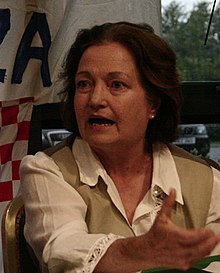Portal:Northern Ireland
|
The Northern Ireland Portal
Introduction  Northern Ireland (Irish: Tuaisceart Éireann [ˈt̪ˠuəʃcəɾˠt̪ˠ ˈeːɾʲən̪ˠ] ; Ulster Scots: Norlin Airlann) is a part of the United Kingdom in the north-east of the island of Ireland that is variously described as a country, province or region. Northern Ireland shares an open border to the south and west with the Republic of Ireland. At the 2021 census, its population was 1,903,175, making up around 3% of the UK's population and 27% of the population on the island of Ireland. The Northern Ireland Assembly, established by the Northern Ireland Act 1998, holds responsibility for a range of devolved policy matters, while other areas are reserved for the UK Government. The government of Northern Ireland cooperates with the government of Ireland in several areas under the terms of the Belfast Agreement. The Republic of Ireland also has a consultative role on non-devolved governmental matters through the British–Irish Governmental Conference (BIIG). Northern Ireland was created in 1921, when Ireland was partitioned by the Government of Ireland Act 1920, creating a devolved government for the six northeastern counties. As was intended by unionists and their supporters in Westminster, Northern Ireland had a unionist majority, who wanted to remain in the United Kingdom; they were generally the Protestant descendants of colonists from Britain. Meanwhile, the majority in Southern Ireland (which became the Irish Free State in 1922), and a significant minority in Northern Ireland, were Irish nationalists (generally Catholics) who wanted a united independent Ireland. Today, the former generally see themselves as British and the latter generally see themselves as Irish, while a Northern Irish or Ulster identity is claimed by a significant minority from all backgrounds. The creation of Northern Ireland was accompanied by violence both in defence of and against partition. During the conflict of 1920–22, the capital Belfast saw major communal violence, mainly between Protestant unionist and Catholic nationalist civilians. More than 500 were killed and more than 10,000 became refugees, mostly Catholics. For the next fifty years, Northern Ireland had an unbroken series of Unionist Party governments. There was informal mutual segregation by both communities, and the Unionist governments were accused of discrimination against the Irish nationalist and Catholic minority. In the late 1960s, a campaign to end discrimination against Catholics and nationalists was opposed by loyalists, who saw it as a republican front. This unrest sparked the Troubles, a thirty-year conflict involving republican and loyalist paramilitaries and state forces, which claimed over 3,500 lives and injured 50,000 others. The 1998 Good Friday Agreement was a major step in the peace process, including paramilitary disarmament and security normalisation, although sectarianism and segregation remain major social problems, and sporadic violence has continued. (Full article...) Selected article -Bloody Friday is the name given to the bombings by the Provisional Irish Republican Army (IRA) in Belfast, Northern Ireland on 21 July 1972, during the Troubles. At least twenty bombs exploded in the space of eighty minutes, most within a half-hour period. Most of them were car bombs and most targeted infrastructure, especially the transport network. Nine people were killed: five civilians, two British soldiers, a Royal Ulster Constabulary (RUC) reservist, and an Ulster Defence Association (UDA) member, while 130 were injured. The IRA said it sent telephoned warnings at least thirty minutes before each explosion and said that the security forces wilfully ignored some of the warnings for their own ends. The security forces said that was not the case and said they were overstretched by the sheer number of bombs and bomb warnings, some of which were hoaxes. The bombings were partly a response to the breakdown of talks between the IRA and the British government. Since the beginning of its campaign in 1970, the IRA had carried out a bombing campaign against civilian, economic, military and political targets in Northern Ireland and less often elsewhere. It carried out 1,300 bombings in 1972. However, Bloody Friday was a major setback for the IRA as there was a backlash against the organization. Immediately after the bombings, the security forces carried out raids on the homes of republicans. Ten days later, the British Army launched Operation Motorman, in which it re-took the no-go areas controlled by Republicans. Loyalist paramilitaries also reacted to the bombings by carrying out 'revenge' attacks on Catholic civilians. (Full article...)Selected picture -Northern Ireland listsRelated portalsSelected biography -
Mairead Maguire (born 27 January 1944), also known as Mairead Corrigan Maguire and formerly as Mairéad Corrigan, is a peace activist from Northern Ireland. She co-founded, with Betty Williams and Ciaran McKeown, the Women for Peace, which later became the Community for Peace People, an organization dedicated to encouraging a peaceful resolution of the Troubles in Northern Ireland. Maguire and Williams were awarded the 1976 Nobel Peace Prize. (Full article...)
Did you know (auto-generated) -
WikiProjectsThings you can do
TopicsCategoriesRecognized Content
Featured articlesGood articles
Featured listsAssociated WikimediaThe following Wikimedia Foundation sister projects provide more on this subject:
Northern Ireland on Wikipedia
Web resources
Discover Wikipedia using portals |










































